Fact check: Rishi Sunak is failing on three of five pledges on the economy, the NHS and immigration
and live on Freeview channel 276
In January 2023, Rishi Sunak announced five promises which he said were his government's and the people's priorities.
They were to halve inflation, grow the economy, reduce government debt, cut NHS waiting lists and stop the boats. Sunak grandly said these were "five foundations on which to build a better future for our children and grandchildren".
Advertisement
Advertisement
He added that there were "no tricks… no ambiguity… we’re either delivering for you or we’re not", asking the British public "to judge us on the effort we put in and the results we achieve". There has however been some ambiguity added to the pledges. This week, Sunak's official spokesperson told journalists that there is no time frame set to achieve any of these - except the promise to half inflation by the end of 2023.
However, given it's one year on, and the Prime Minister asked us to judge him, we take a look at how he is faring with his five priorities, pledges or promises (whatever you want to call them).
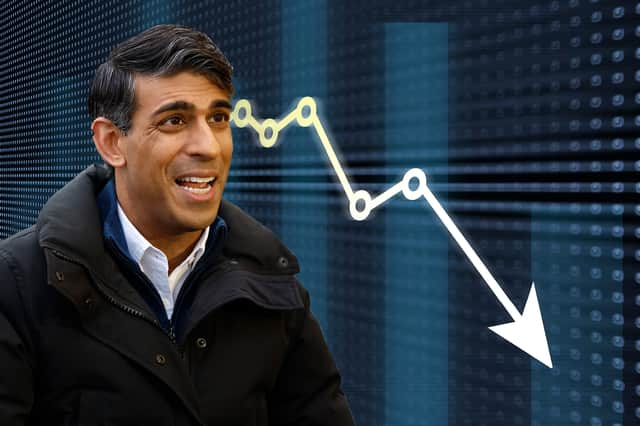

1. Halve inflation
Rishi Sunak's headline promise in January was to halve inflation, which was at 10.7% when he made the commitment. At the time, economists and the Bank of England were predicting that inflation would drop much lower than the 5.35% that was needed for the PM's promise to come true.
And while for much of the year Sunak would have been worried, as inflation proved far more stubborn than expected, eventually it dipped down to 3.9%. The PM has made much of this, however it was actually something he has had little impact on. The Bank of England is tasked with keeping inflation down through interest rate rises, and is independently in charge of monetary policy.
Verdict: success
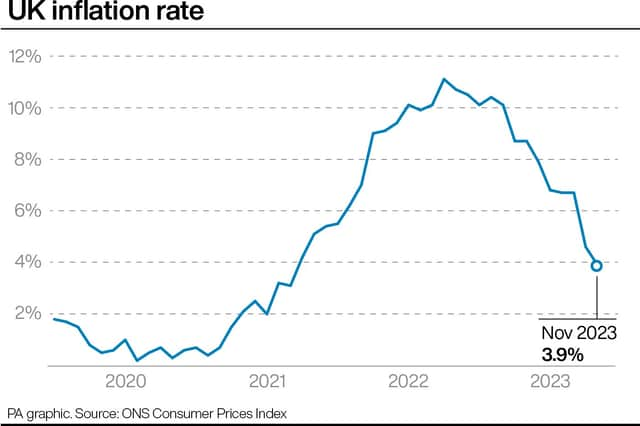

2. Grow the economy
Advertisement
Advertisement
This was another fairly unambitious pledge - to grow the economy in real terms. That has only failed to happen year-on-year eight times since 1949, and should be the most basic requirement of government, not something to be greeted with great fanfare.
Yet for much of the year even this appeared to be in some doubt, with the economy still very sluggish and stagnant. The Office for National Statistics measures this by gross domestic product (GDP), which is the monetary value of all the UK's goods and services, and it found that between April and June it flatlined and from July to September the economy shrunk. One more quarter of contraction and the UK would be in a recession.
However, the Bank of England and Office for Budget Responsibility expect that overall the economy will have grown by 0.5% in 2023 (they finalise this in 2024). This may allow Sunak to say he has met his pledge, but it’s unlikely such low growth will filter through to voters' personal finances and make them feel better off.
Verdict: on track ... just
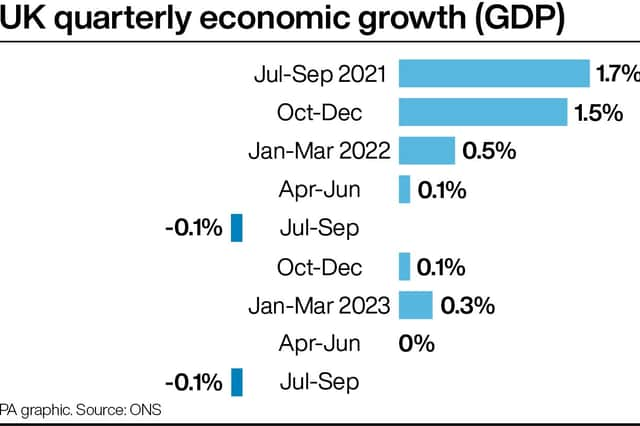

3. Reduce government debt
Despite Rishi Sunak saying that "debt is falling", that is demonstrably not the case. According to the Institute for Government, public debt rose from 85.1% of GDP in December 2022 to 88.3% of GDP in November 2023. And it's estimated to keep rising to 93.2% of GDP in the 2026-27 financial year.
Advertisement
Advertisement
One of the government's fiscal rules is that debt will fall by the end of a five-year forecast period, and it is predicted to, just, to 92.8% of GDP in 2027-28 (which is still significantly higher than when Sunak made his pledge). The Prime Minister has also been reprimanded by the chair of the UK Statistics Authority for saying that "debt is falling".
It’s unclear why Sunak chose to make this as one of his pledges - as it’s not something that will make an obvious impact on people’s personal finances during the cost of living crisis and is hard for them relate to.
Verdict: failure
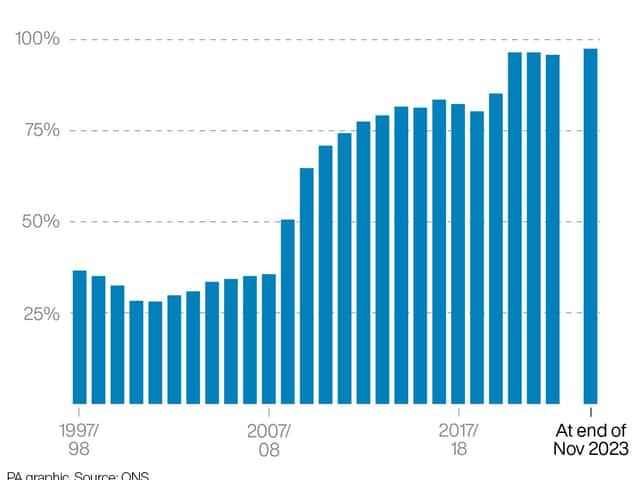

4. Cut NHS waiting lists
Rishi Sunak promised to cut NHS waiting lists (in England only as health is devolved to Wales, Scotland, and Northern Ireland) so that patients could get care faster. He said: "NHS waiting lists will fall and people will get the care they need more quickly." Sunak promised the government was taking “urgent action” by providing 7,000 more hospital beds and increasing funding to social care so more people can be discharged from hospitals.
In December 2022, the overall NHS waiting list in England was 7.2million. Since then, it's consistently hit record highs, with the latest figures showing more than 7.7million people are waiting for care. The Department for Health is still grappling with strikes, with a junior doctors walk out ongoing at the time of writing.
Advertisement
Advertisement
Dr Sarah Scobie, the Nuffield Trust's acting director of research, told NationalWorld: "In order to get the waiting list down, we don't just need to increase activity to meet the demand which would have been there anyway, we also need to meet the demand that has built up since the pandemic and because of the pressure on the NHS. We need to do even more than that to ensure it will go down." Sunak has blamed the strikes, however industrial action was already affecting the NHS when he announced his promise. This one will be very hard to turn around before the election.
Verdict: failing
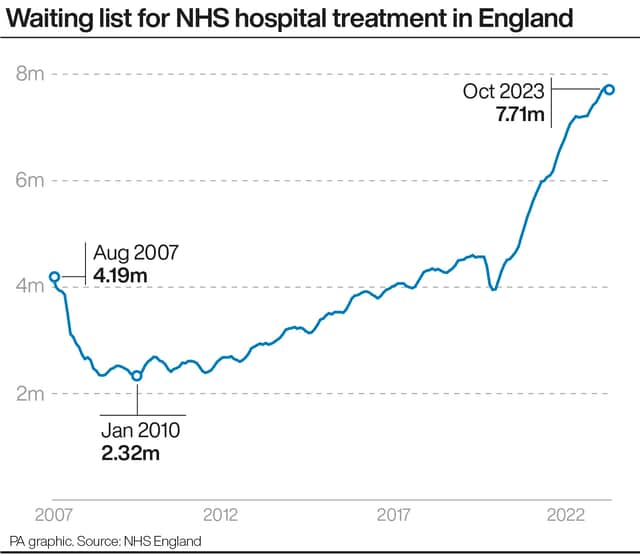

5. Stop the boats
The Prime Minister has two definitions of this pledge. One is simply to stop the boats, which the Home Secretary James Cleverly has said the government wants to do in its entirety (talk about making an ambitious promise).
During his speech, Sunak also said the government would "pass new laws to stop small boats, making sure that if you come to this country illegally, you are detained and swiftly removed". While crossings have reduced over the last year, more than 30,000 people have arrived since the PM's speech and he's failed to pass his main piece of legislation - the Rwanda bill.
This aims to send asylum seekers to the east African country for processing and resettlement, with the hope it deters other people crossing in small boats. However the policy was declared unlawful by the Supreme Court and so now Sunak is try to get a bill through Parliament which unilaterally states that Rwanda is a safe country. There is currently no date set for when the bill will return to Parliament. On both metrics of stopping the boats, the PM appears to be failing.
Verdict: failing
Verdict: Sunak failing in three out of five pledges
Advertisement
Advertisement
So, Sunak is failing to achieve three of his five pledges - reducing government debt, cutting NHS waiting lists and stopping the boats. And the two he's succeeding with he'll probably get hardly any credit, as inflation is the Bank of England's responsibility and growth is so low it will hardly make a dent.
Despite saying there were "no tricks… no ambiguity", the Prime Minister has built himself a bit of breathing room by not putting a timescale on any of the three promises he's failing on. Whether voters will accept this is another matter.
What's striking about the five pledges is it now appears like a political blunder. Politicians are reluctant to make cast-iron commitments and with these Sunak has shown us why. They're easy sticks for his opponents to beat him with.
The first two pledges are probably not worth making, as he'll hardly get any credit, and the last two are clearly so far out of his control, that it was a fool's errand to make them. I doubt we'll be seeing another five promises in 2024, Sunak is still working on his from last year.
Advertisement
Advertisement
Ralph Blackburn is NationalWorld’s politics editor based in Westminster, where he gets special access to Parliament, MPs and government briefings. If you liked this article you can follow Ralph on X (Twitter) here and sign up to his free weekly newsletter Politics Uncovered, which brings you the latest analysis and gossip from Westminster every Sunday morning.
Comment Guidelines
National World encourages reader discussion on our stories. User feedback, insights and back-and-forth exchanges add a rich layer of context to reporting. Please review our Community Guidelines before commenting.
